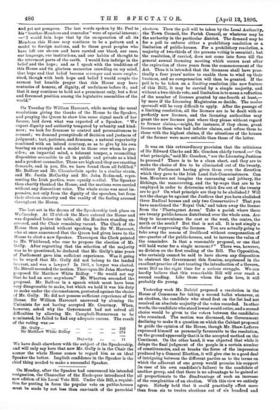The last act in the drama of the Speakership took
place on Wednesday. At 12 o'clock the Mace entered the House and was deposited below the table, all the Members standing un- covered, and the Chair remaining vacant. The Clerk of the House then pointed without speaking to Sir W. Harcourt, who at once announced that the Queen had given leave to the House to elect a new Speaker. Thereupon the Clerk pointed to Mr. Whitbread, who rose to propose the election of Mr. Gully. After regretting that the selection of the majority was to be questioned, he declared that Mr. Gully's nine years of Parliament gave him sufficient experience. Was it going to be urged that Mr. Gully did not belong to the landed interest, and was a lawyer ? In 1801, a lawyer was elected. Mr. Birrell seconded the motion. Thereupon Sir John Mowbray proposed Sir Matthew White Ridley. `. He would not say that he had an acre anywhere." Mr. Wharton seconded the proposal. Mr. Balfour in a speech which must have been very disagreeable to make, but which we hold it was his duty to make under the circumstances, protested against the choice of Mr. Gully. He did not possess sufficient experience of the House. Sir William Harcourt answered by abusing the Unionists for not having accepted Mr. Courtney. When, however, asked why the Goyernment had not solved all difficulties by allowing Mr. Campbell-Bannerman to be nominated, he failed to find any adequate excuse. The result of the voting was
Mr. Gully... ..
Sir Matthew White Ridley Majority ... 11
We have dealt elsewhere with the subject of the Speakership, and will only say here that now Mr. Gully is in the Chair the sooner the whole House comes to regard him as an ideal Speaker the better. Implicit confidence in the Speaker is the chief thing needed to make a successful Speaker. ... ... 235 ... 274


































 Previous page
Previous page